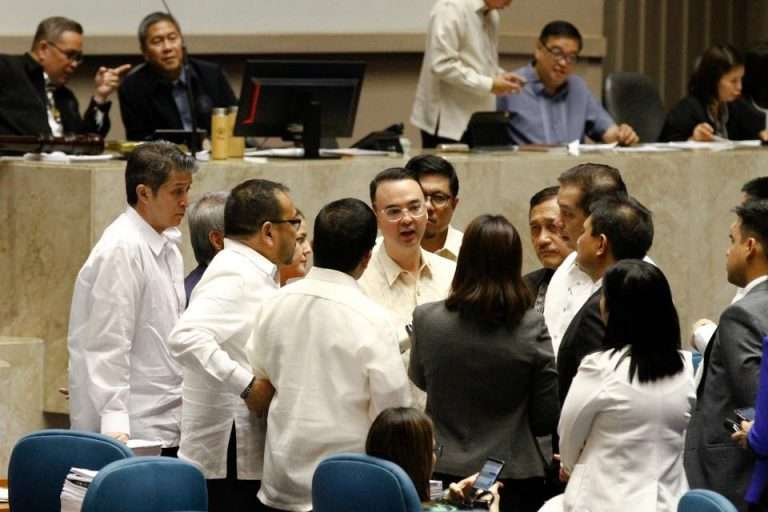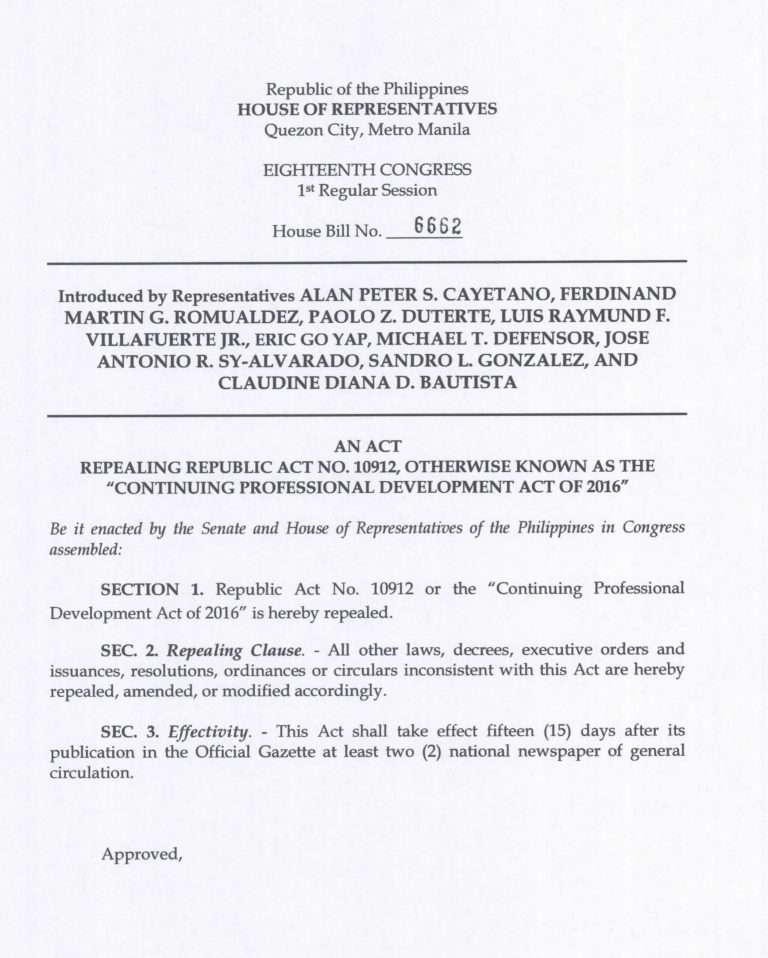Lawmakers seek repeal of CPD Law
Lawmakers seek repeal of CPD Law
It has been 6 years since the Republic Act 10912 or the Continuing Professional
Development Act of 2016 (CPD Law) was enacted into law purposely to enhance and maintain high professional occupational and technical standards in the practice of a profession and to institute measures that will strengthen the continuing professional education program of the government. Under the law, the CPD is a mandatory requirement for the renewal of Professional Identification Cards, with each professional given three years to complete the required credit units ranging from 15 or 45 for some professionals.
Let’s take a look of the background of CPD law.
On January 22, 2015, Senators Antonio “Sonny” F.
Trillanes, Cynthia A. Villar and Senator
Francis “Chiz” G. Escudero introduced Senate Bill No. 2581 (Continuing
Professional Development Act of 2015) in the 16th Congress under
Aquino administration. After a series of interpellation and amendments, the
bill received the majority votes with no negative vote and no abstention.
Here are the following lawmakers who voted in favor of
the bill on the third and final reading dated August 3, 2015:
|
Sen. Paolo Benigno “Bam” Aquino IV |
Sen. Loren B. Legarda |
|
Sen. Alan Peter S. Cayetano |
Sen. Ferdinand “BongBong” R. Marcos |
|
Sen. Pia S. Cayetano |
Sen. Sergio R. Osmena III |
|
Sen. Franklin M. Drilon |
Sen. Aquilino Koko L. Pimentel III |
|
Sen. Joseph Victor G. Ejercito |
Sen. Grace L. Poe |
|
Sen. Francis “Chiz” G. Escudero |
Sen. Ralph G. Recto |
|
Sen. Teofisto “TG” Guingona III |
Sen. Vicente C. Sotto III |
|
Sen. Gregorio B. Honasan II |
Sen. Cynthia A. Villar |
|
Sen. Manuel “Lito” M. Lapid |
|
The bill was sent to House of Representatives for concurrence
and was adopted as an amendment to House Bill No. 6423 on June 16, 2016. On the
same day, the Senate Bill No. 2581 was sent to the Office of the President
through Presidential Legislative Liaison Office for signature and approval of
President Benigno S. Aquino III.
The said law was enacted without the approval of the
President, however, by virtue of Section 27 par. 1 of Article 6 of the 1987
Constitution, the bill become a law as if the President had signed it or what
we called “lapsed into law”.
On June 30, 2016, Senate bill No. 2581 became Republic
Act 10912 and took effect in March 2017 after the Professional Regulation
Commission (PRC) presented Resolution
No. 1032 covering its implementing rules and regulation.
The PRC received numerous complaints from the
professionals which prompted the commission to issue new implementing rules and
regulations of CPD law under PRC Resolution No. 2019-1146
which took effect on March 19, 2019.
Under the new IRR, the CPD is still mandatory for all
professionals however it decreases the number of units to be earned from 45
units down to 15 units for three year renewal period of your PRC License.
The implementation of the CPD Law has been agony from the
professionals, like teachers, engineers, accountants, nurses, and most
especially criminologists where the majority of them are applicants in the PNP
or worst unemployed.

There were several bills filed by Congress that seek to
repeal or amend the CPD Law, two of them were former Senator now House Speaker
Alan Peter Cayetano and Senator Ralph G. Recto where they voted in favor of the
CPD Law in 2016 during the senate deliberation of the said law. Aside from House
Speaker Cayetano, the following lawmakers who co-authored to repeal the CPD
Law:
|
Senate/House
Bill No./TITLE |
Co-Authors |
|
House Bill No. 6662 or “An Act Repealing Act No.10912,
Otherwise known as the “Continuing Professional
Development Act of 2016” |
Rep. Ferdinand Martin G Romualdez Rep. Paolo Z Duterte Rep. Luiz Raymund F Villafuerte Jr. Rep. Eric Go Yap Rep. Michael T Defensor Rep. Jose Antonio R Sy-Alvarado Rep. Sandro L Gonzalez Rep. Claudine Diana D Bautista |
|
Senate
Bill No. 536 or “An Act Repealing Act No.10912, Otherwise known as the “Continuing Professional Development Act
of 2016” |
Sen. Juan Miguel F Zubiri |
|
Senate
Bill No. 1016 or “An Act Amending Certain Provisions of Republic 10912, Otherwise
known as the “Continuing Professional
Development Act of 2016” |
Sen. Ramon Bong Revilla Jr. |
Many professionals are against the current CPD Law due to
the costs of undergoing the required trainings, seminars or other activities
undertaken that are related to their profession to earn the necessary CPD
units.
In his explanatory note, Senator Zubiri said that professionals having to travel to various points of the country just to attend seminars and training courses that would earn them only about one-third of the required credit units, and in some cases, the overall cost, which covers registration fees, airfare and accommodation, reach as high as 20,000 pesos. In addition to this, there are also claims that some seminars and training courses turn out to be unrelated to the field of expertise of the attendees. Hence, it defeats the purpose of the law, and attendance to such activities becomes more for compliance rather than for continuing professional development.

Former House Deputy Speaker Paolo Duterte said that while it was supposed to promote lifelong learning among Filipino professionals, the implementation of the said measure turned out to put greater burden to Filipino professionals. To renew their licenses and continue the practice of their respective professions, they are forced to spend bulk of their salary, take absences from work, and go through unreasonable hardships.
ALSO READ: How to
Make Money Online: Earn Money Online
Meanwhile, Senator Manuel “Lito” Lapid has filed Senate
Bill No. 1299 to exempt qualified overseas workers from CPD Law as they faced
criticism and challenges for complying with the said requirements.
While the government support the continued growth and
development of more than four million registered Filipino professionals, it
also acknowledge the burden that this system is imposing on them, most
especially on the minimum wage earners and Overseas Filipino Workers.